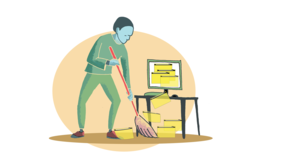One in four internet users are overwhelmed by the clutter in their browser

Five billion people spend almost half of their waking hours online. According to a new study from Aalto University, browser clutter is a serious problem for one in four of them. The results will be presented on April 27 at CHI 2023, the leading conference for human-computer interaction research.
‘We began exploring which challenges make users feel overwhelmed when browsing the internet. We also mapped the behaviors that cause the clutter and how users react to the stress,’ says Associate Professor and Head of Department Janne Lindqvist.
Browsing habits play a major role in cluttering up a browser. Using interviews and an online survey, the researchers found that clutter-related stress goes up when users keep a large number of tabs and browser windows open, as well as because of interactive elements like ads and pop-up windows.
Multitasking adds to the problem, and it gets worse if users are hesitant to close tabs or are dealing with complex tasks. Clutter also accumulates when users have tabs open related to different online activities – for example, if they’re managing a travel reservation in one tab and chatting with friends or colleagues in another.
‘It’s as though a kitchen table were being used as a dining table, a desk for older children's homework, and a play table for the youngest – all at the same time and without any tidying,’ explains Lindqvist.
Leaving web pages open after you’re done with them adds to the mess, and clutter is also influenced by how we search for information and move from page to page. ‘People easily forget what they were looking for. Our concentration lapses when interesting things appear on screen, and then we start following links and collecting tabs,’ says Lindqvist.
Only problem-focused strategies help with the actual problem
The study found that many users react to stress by trying to change either their behavior or their attitude towards the clutter. Only the former, problem-focused solutions, proved helpful in solving the issue. An example solution would be to consciously minimize clutter by deciding on an upper limit to the number of tabs you have open.
‘But even problem-focused solutions aren’t always effective, as we learned from our interview participants. Sometimes, the effort stops users from adopting these strategies,’ notes doctoral researcher Rongjun Ma.
The researchers found that trying to cope by changing your attitude can be counter-productive. Emotion-focused strategies, like trying not to think about the stress or adapting to it through discussions among colleagues can end up sustaining the problem by preventing people from using solutions that would actually tackle the clutter.
But emotion-focused strategies can also be useful in certain situations, notes doctoral researcher Henrik Lassila. ‘An individual user has very limited means to influence the number of pop-up windows or advertisements on a website, for example, so finding ways to cope can help,’ says Lassila.
The researchers pointed out that ‘organizing’ techniques, such as using tools to manage tabs, might just lead to more clutter. ‘These approaches are similar to someone not actually cleaning but just rearranging things in the same space – the problem doesn’t go away,’ says Lindqvist.
Lindqvist hopes that the team’s findings will help people examine their own browsing behavior and improve their experience. To him, this research fits into a broader effort to benefit from computers while dealing with as few of their quirks and disadvantages as possible.
‘We use computers every day, and it's definitely not always ideal. Many things would actually be much better handled only on paper,’ he says. ‘I look at this from the point of view of how we can live a meaningful and good life despite computers.’
Read more news

Apply Now: Unite! Visiting Professorships at TU Graz
TU Graz, Austria, invites experienced postdoctoral researchers to apply for two fully funded visiting professorships. The deadline for expressions of interest is 20 February 2026, and the positions will begin on 1 October 2026.
Hanaholmen’s 50th anniversary exhibition lives on online – making the history of Finnish–Swedish cooperation accessible worldwide
MeMo Institute at Aalto University has produced a virtual 3D version of the anniversary exhibition of Hanaholmen.Soil Laboratory Exhibition – Exploring the Dialogue Between Human and the Earth in Utsjoki
Soil Laboratory explores the relationship between humans and the earth as a living landscape through ceramic practices in Utsjoki.






